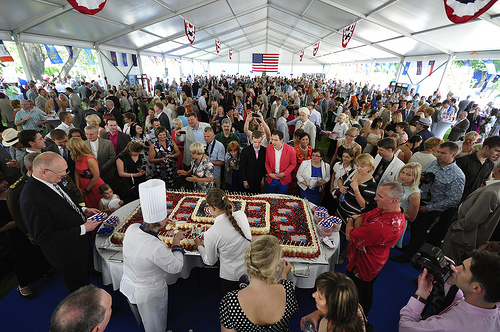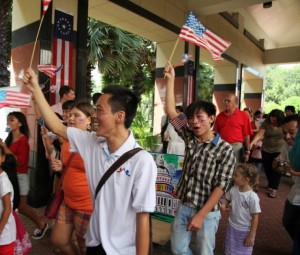
Independence Day-An Opportunity for Cultural Diplomacy
Cultural diplomacy’s aim is to promote understanding between two nations based in the knowledge of one other’s customs and mores. It is through this cultural understanding that meaningful relationships can be built and developed. These meaningful relationships are the building blocks on which future diplomatic interactions can be built.
According to a 2005 report issued by the U.S. Department of State, “Cultural diplomacy is the linchpin of public diplomacy; for it is in cultural activities that a nation’s idea of itself is best represented.”
In the U.S., the festivities surrounding the celebration of Independence Day have come to include the veneration of all things considered culturally “American.” We all know what this means—barbeques, hot dogs, hamburgers, apple pies, corn on the cob and coleslaw, along with fireworks, carnivals, patriotic music, baseball, parades and all things red, white, and blue.
In short, Independence Day is a celebration of all aspects of American culture offering a unique opportunity for the U.S. to promote cultural understanding with a variety of “American” themed events abroad.
This Independence Day, many U.S. embassies celebrated American culture and conducted cultural diplomacy.
 For example, the U.S. Embassy France held an annual garden party and honored France’s assistance in winning the American Revolutionary War, the U.S. Embassy Cambodia held an Independence Day celebration with a “small town in the United States” theme, the U.S. Embassy Estonia held a California themed celebration, U.S. Embassy New Zealand hosted the superhero themed “4th of steel” and U.S. Embassy Norway celebrated the 4th with an American themed barbeque and garden party.
For example, the U.S. Embassy France held an annual garden party and honored France’s assistance in winning the American Revolutionary War, the U.S. Embassy Cambodia held an Independence Day celebration with a “small town in the United States” theme, the U.S. Embassy Estonia held a California themed celebration, U.S. Embassy New Zealand hosted the superhero themed “4th of steel” and U.S. Embassy Norway celebrated the 4th with an American themed barbeque and garden party.
Some events were not only a celebration of American culture, but were also intended to honor the culture of the embassies’ host nations as well. In these cases, U.S. Peace Corps volunteers sang the Cambodian National Anthem at the Independence Day celebration at the U.S. Embassy Cambodia, the Israeli Conservatory of Music provided the entertainment for the festivities in the U.S. embassy Israel and the U.S. Embassy Jamaica included performances by the Jamaican Folk Singers and the Jamaica Military Band.
As just one part of the entire public diplomacy array, cultural diplomacy should be used in coordination with other public diplomacy techniques. Cultural diplomacy events, such as these Independence Day celebrations, offer an opportunity to open dialogue and create understanding upon which relationships may be built. For example, a child could attend an Independence Day celebration at a U.S. embassy which may spark interest in American culture. This interest and understanding of American culture could inspire that child to consider certain values when making important decisions later in life, or become a partner for future cooperation.
This is not to say that public and cultural diplomacy are the answer to all the world’s problems. One only has to look back to the “hot dog diplomacy” mishap of 2009 to realize how fragile some components of cultural diplomacy can be. In late May 2009, in an effort aimed at thawing relations with Iran, the United States invited Iranian diplomats to participate in Independence Day celebrations held in U.S. embassies across the globe. Less than a month later, however, the United States disinvited Iranian diplomats from attending the celebrations in light of the Iranian government’s strict crackdown on the demonstrations surrounding the disputed presidential election.
Cultural diplomacy is a key component in the public diplomacy toolbox, however it cannot exist in a vacuum. Independence Day celebrations and the cultural diplomacy that accompanies them are only one small part of an overall public diplomacy integrated strategy. Cultural diplomacy can help to strengthen relationships among citizens, however the governments in which these relationships are built need to have a healthy environment so that they can have their desired effect.






[…] Independence Day-An Opportunity for Cultural Diplomacy […]